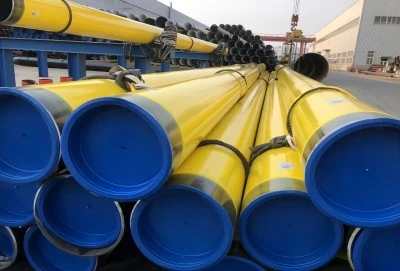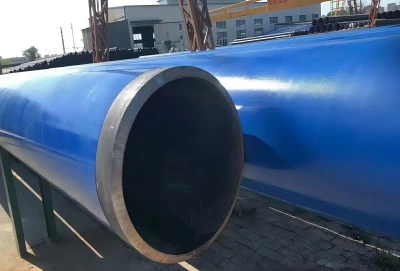When it comes to selecting the right piping for gas transportation, the choice between epoxy coated steel gas pipe and galvanized options can significantly impact project success. Epoxy coated gas pipes offer superior corrosion resistance, longer service life, and enhanced environmental performance compared to their galvanized counterparts. This comprehensive guide delves into the key differences between these two pipe types, helping engineers and project managers make informed decisions for their gas infrastructure projects.
|
|
|
Corrosion Protection Mechanism
FBE Coating: Advanced Barrier Against Corrosion
Fusion-bonded epoxy (FBE) coating represents a cutting-edge solution in corrosion protection for steel gas pipes. This advanced coating forms an impermeable barrier that shields the underlying steel from corrosive elements, moisture, and chemical attacks. The FBE process involves electrostatically applying dry epoxy powder to preheated pipes, resulting in a uniform, tightly bonded layer that adheres to the steel surface at a molecular level.
The exceptional durability of FBE-coated pipes stems from their resistance to cathodic disbondment, which is crucial in maintaining the integrity of underground pipelines. This property ensures that even if the coating is damaged, corrosion will not spread beneath the protective layer, preserving the pipe's structural integrity over time.
Galvanization: Sacrificial Protection for Steel Pipes
Galvanized pipes, on the other hand, rely on a sacrificial protection mechanism. The zinc coating applied to the steel surface acts as a barrier and sacrificial anode, corroding preferentially to protect the underlying steel. While effective in the short term, this method has limitations in harsh environments or when exposed to certain chemicals that can accelerate zinc corrosion.
The thickness of the zinc coating directly correlates with the pipe's lifespan, but even thick coatings may not provide the long-term protection required for critical gas transportation infrastructure, especially in aggressive soil conditions or marine environments.
Long-term Performance in Harsh Environments
In challenging conditions such as high-temperature operations, acidic soils, or marine atmospheres, epoxy coated steel gas pipes significantly outperform galvanized alternatives. The chemical resistance of epoxy coatings provides superior protection against a wide range of corrosive agents, ensuring the longevity of gas pipeline systems even under extreme conditions.
Field studies have shown that FBE-coated pipes can maintain their integrity for decades, with some installations lasting over 50 years without significant degradation. This long-term performance translates to reduced maintenance costs and fewer service interruptions, making epoxy coated pipes a cost-effective choice for large-scale gas transportation projects.
Environmental Performance
Eco-friendly Application of Epoxy Coated Steel PipesThe environmental impact of pipeline materials is a growing concern in the gas industry. Epoxy coated steel gas pipes offer significant advantages in this regard. The coating process for these pipes produces minimal volatile organic compounds (VOCs), aligning with stringent environmental regulations. Moreover, the durability of epoxy coatings reduces the frequency of pipe replacement, thereby minimizing the carbon footprint associated with manufacturing and installing new pipes.
Epoxy coatings also contribute to soil and groundwater protection. Unlike some traditional coatings, properly applied epoxy does not leach harmful substances into the surrounding environment, making it an ideal choice for environmentally sensitive areas or regions with strict ecological preservation laws.
Galvanized Pipes: Zinc Runoff Concerns
While galvanized pipes have been widely used for decades, environmental concerns have emerged regarding zinc runoff. As the zinc coating corrodes over time, it can release zinc ions into the soil and water systems. In high concentrations, this can adversely affect aquatic ecosystems and potentially contaminate groundwater sources.
The environmental impact of zinc runoff is particularly problematic in areas with acidic soils or high water tables, where the rate of corrosion and subsequent zinc release can be accelerated. This has led to increased scrutiny and, in some cases, restrictions on the use of galvanized pipes in certain environmental conditions.
Sustainability in Gas Pipeline Infrastructure
The choice between epoxy coated and galvanized pipes plays a crucial role in the overall sustainability of gas pipeline infrastructure. Epoxy-coated steel gas pipes contribute to sustainable development through their extended service life, reduced maintenance requirements, and minimal environmental impact during operation.
By choosing epoxy coated pipes, project managers can demonstrate a commitment to long-term environmental stewardship. The reduced need for pipe replacement not only conserves resources but also minimizes the disruption to ecosystems during maintenance and repair operations. This aligns with global initiatives to reduce the environmental footprint of energy infrastructure projects.
Regulatory Compliance
Meeting Global Standards for Gas TransportationThe gas transportation industry is subject to stringent regulations aimed at ensuring safety, reliability, and environmental protection. Epoxy coated steel gas pipes have gained widespread acceptance due to their ability to meet and exceed these global standards. Organizations such as the American Petroleum Institute (API) and the International Organization for Standardization (ISO) have developed comprehensive guidelines for the use of protective coatings in gas pipelines.
Epoxy coatings, particularly FBE, comply with rigorous standards like API 5L for line pipe specifications and ISO 21809-2 for external pipeline coatings. These standards address critical factors such as coating adhesion, impact resistance, and chemical resistance, ensuring that epoxy coated pipes can withstand the demanding conditions of gas transportation.
Safety Certifications for Epoxy vs Galvanized Pipes
When it comes to safety certifications, epoxy coated steel gas pipes often have an edge over galvanized alternatives. Many certification bodies recognize the superior performance of epoxy coatings in critical safety areas such as fire resistance and prevention of gas permeation through the pipe wall.
For instance, epoxy coatings can achieve higher ratings in fire resistance tests, which is crucial for gas pipelines in high-risk areas. Additionally, the seamless nature of properly applied epoxy coatings provides a more reliable barrier against gas leakage, a critical safety consideration in pipeline design and operation.
Industry-specific Regulations and Pipe Selection
Different sectors within the gas industry may have specific regulations that influence pipe selection. For offshore platforms and subsea pipelines, regulations often favor epoxy coated pipes due to their superior resistance to saltwater corrosion and ability to withstand high pressures.
In the context of urban gas distribution networks, local regulations may prioritize factors such as soil compatibility and long-term stability. Here, the chemical inertness and durability of epoxy coatings often make them the preferred choice, especially in areas with aggressive soil conditions or high groundwater levels.
The comparison between epoxy coated steel gas pipes and galvanized alternatives reveals clear advantages for epoxy coated options in terms of corrosion protection, environmental performance, and regulatory compliance. For professionals in the oil and gas industry, water supply systems, and large-scale engineering projects, epoxy coated pipes offer a superior solution that combines durability, safety, and sustainability. As the industry continues to evolve, the adoption of advanced coating technologies like FBE will play a crucial role in building resilient and efficient gas transportation infrastructure worldwide.
Epoxy Coated Steel Gas Pipe For Sale
Hebei Longma Group offers premium steel gas pipes that meet the highest industry standards. Our state-of-the-art production facilities, equipped with German-imported technology and four independently developed production lines, ensure top-quality products. With a team of over 300 skilled professionals, including 60+ technical experts, we guarantee precision and innovation in every pipe we manufacture.
Our comprehensive testing facilities, featuring ultrasonic automatic flaw detectors and industrial X-ray equipment, ensure that each pipe meets rigorous quality standards. We pride ourselves on fast delivery, with standard thickness pipes ready in as little as 7 days. Our products are backed by complete certifications, including API 5L, ISO 9001, ISO 14001, and more, meeting global regulatory requirements.
Leveraging our long-term partnerships with raw material suppliers and our integrated production model, we offer competitive pricing without compromising on quality. Our epoxy coated steel gas pipes are available in diameters ranging from 60.3mm to 1422mm, with wall thicknesses from 6.02mm to 50.8mm, complying with API 5L, ASTM A53, EN10210, and AS/NZS 1163 standards. The coating meets DIN 30670, DIN30678, CSAZ245.20, EN10339, ISO21809-1, AWWAC210, and C213 specifications.
For inquiries about our high-quality epoxy-coated gas pipes or to discuss your project requirements, contact us at info@longma-group.com.














